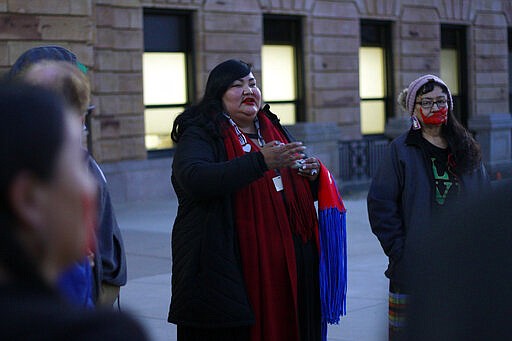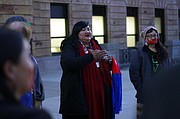Gov. Noem's revival of riot laws heads to Senate vote
Stephen Groves | Hagadone News Network | UPDATED 5 years, 11 months AGO
PIERRE, S.D. (AP) — A South Dakota Senate committee on Tuesday advanced Gov. Kristi Noem's proposal to revive the state's riot laws with criminal and civil penalties for those who urge rioting.
Native American groups opposed to the Keystone XL pipeline warned that the initiative would stoke tensions that could lead to situations similar to the stand-offs over the Dakota Access Pipeline in North Dakota. The bill will next be voted on by the full Senate. It has already passed the House.
Candi Brings Plenty, a lobbyist for the American Civil Liberties Union, said the bill “sets the stage for a continuation of tensions.”
Many tribal members spoke of their experiences of demonstrations at Standing Rock and described how law enforcement used violence and threats of incitement to riot charges against them. They argued that the bill represents another step in long-standing oppression of Native American people since the violation of treaties dating back to the 1800s.
Sen. Lee Schoenbeck, a Republican from Watertown, said that protesters also committed violence against law enforcement at Standing Rock.
The Legislature passed a so-called riot boosting law last year that attempted to prevent a situation similar to those demonstrations. The Republican governor wanted to pursue groups that fund demonstrations with criminal and civil penalties. But a judge found parts of last year’s laws to be unconstitutional, in part because they were overly broad in limiting free speech and aimed specifically at demonstrations against the Keystone XL pipeline.
Noem came back this year with a bill that cleaned up the state's criminal and civil penalties for riot and incitement to riot, arguing that she is making sure everyone stays safe in the state. She is also pushing civil penalties so that the state, counties or municipalities can recoup damages caused by riots.
The governor's staffers argued that the bill does not infringe on people's rights to protest, but seeks to protect property and people from violence.
Katie Hruska, a lawyer with Noem's office, explained that the bill is designed to pass what's known as the Brandenburg test for free speech, which stipulates that authorities can’t prosecute speech unless the speech is intended to cause force or violence, is likely to cause it, and the action is imminent.
Law enforcement groups, including the South Dakota Police Chiefs Association and the Sheriff's Association, spoke in support of the bill.
“As long as people don’t incite lawless action, there is nothing to fear from this bill," said Dick Tieszen, a lobbyist for the Sheriff's Association.
Opponents of the bill spoke for over an hour-and-a-half in often-charged testimony. Opponents stood at several times to express respect for speakers, and women let out trills, a way Lakota women praise courage. After the meeting ended, opponents sang a Lakota prayer song while lawmakers filed out of the room.
They raised a host of concerns with the proposed Keystone XL pipeline, saying that it threatens the health of the water and environment as well as people who would be put at increased risk of kidnapping, murder and sexual exploitation from the influx of temporary workers into small communities.
Noem has argued that the bill is not designed solely for the pipeline project, but to establish protections for any demonstrations in the state.
Opponents, and even some lawmakers who support the bill, disagreed with that argument.
“It’s clear to me that the genesis of the bill has to do with the pipeline and what happened in North Dakota," said Sen. Lance Russell, a Hot Springs Republican who voted to approve the bill.
The lone Democrat on the committee opposed the bill and warned that he thought it may be challenged in court again.
Craig Kennedy, the Democrat from Yankton, said, “We’re going to deal with an unconstitutional bill that is designed for the sole purpose of protecting the pipeline project.”
ARTICLES BY STEPHEN GROVES
GOP-led states see Texas law as model to restrict abortions
SIOUX FALLS, S.D. (AP) — Republican states that have passed increasingly tough abortion restrictions only to see them blocked by the federal courts have a new template in an unusually written Texas law that represents the most far-reaching curb on abortions in nearly half a century.
GOP-led states see Texas law as model to restrict abortions
SIOUX FALLS, S.D. (AP) — Republican states that have passed increasingly tough abortion restrictions only to see them blocked by the federal courts have a new template in an unusually written Texas law that represents the most far-reaching curb on abortions in nearly half a century.
GOP-led states see Texas law as model to restrict abortions
SIOUX FALLS, S.D. (AP) — Republican states that have passed increasingly tough abortion restrictions only to see them blocked by the federal courts have a new template in an unusually written Texas law that represents the most far-reaching curb on abortions in nearly half a century.



